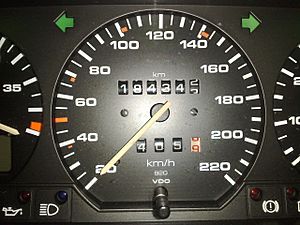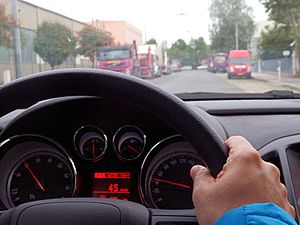Kilometres per hour facts for kids
Quick facts for kids Kilometres per hour |
|
|---|---|
|
A car speedometer that indicates measured speed in kilometres per hour
|
|
| General information | |
| Unit system | derived |
| Unit of | speed |
| Symbol | km/h |
| Conversions | |
| 1 km/h in ... | ... is equal to ... |
| mph | 0.621371 |
| m/s | 0.277778 |
| knot | 0.539957 |
| ft/s | 0.911344 |
The kilometre per hour (often shortened to km/h) is a unit of speed. It tells us how many kilometres something travels in one hour.
Think of it like this: if you are driving at 60 km/h, it means you would travel 60 kilometres if you kept that speed for one hour.
Around the world, km/h is the most common unit of speed. You will see it on traffic signs and car speedometers in many countries.
How We Got "Kilometres Per Hour"
The idea of measuring distance in metres started a long time ago. The metre was officially defined in 1799. However, the term "kilometres per hour" did not become popular right away.
Different ways to write "kilometres per hour" have been used over time. Today, you might see "km/h", "kmph", or "km/hr" in English. These shorter forms started appearing in the late 1800s. In some places, like Australia, people might even say "klicks" or "clicks" when talking about kilometres per hour.
Why is km/h Important?
Using kilometres per hour helps us understand how fast things are moving. It is a simple way to measure speed for many everyday activities. For example, it tells us how fast a car is going or how quickly a runner finishes a race.
This unit makes it easy to compare speeds. If one car is going 100 km/h and another is going 50 km/h, you know the first car is twice as fast. It helps keep traffic safe and organized on roads worldwide.
See also
 In Spanish: Kilómetro por hora para niños
In Spanish: Kilómetro por hora para niños
 | Jessica Watkins |
 | Robert Henry Lawrence Jr. |
 | Mae Jemison |
 | Sian Proctor |
 | Guion Bluford |



